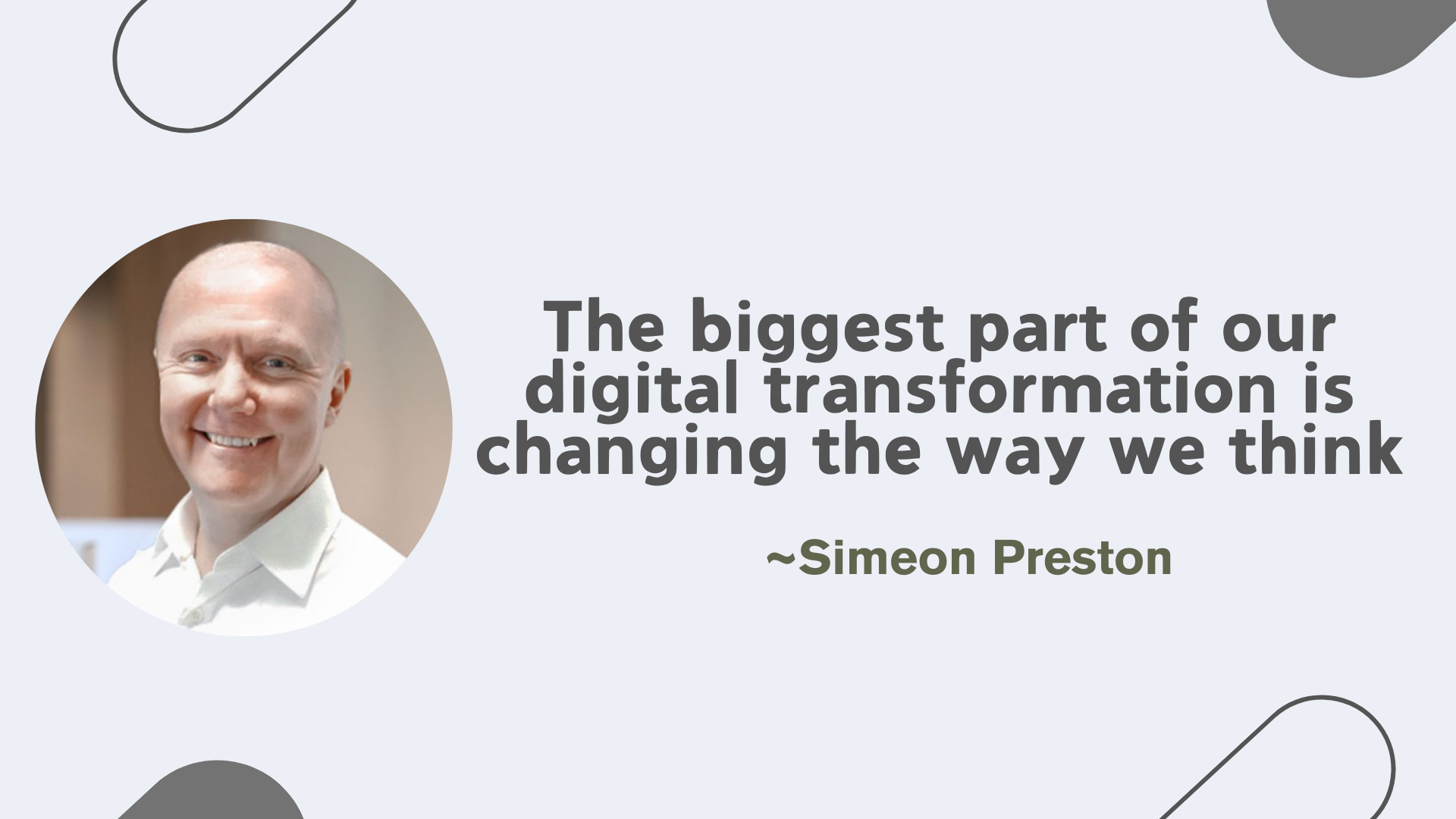Table of Contents
Introduction
The AI adoption in business has ushered in a wave of rapid technological advancements that have changed how businesses operate, interact with customers, and deliver value. Among these transformative technologies, AI and digital strategy have emerged as critical drivers of digital transformation.
Artificial intelligence in digital transformation is reshaping industries, enhancing productivity, and opening new avenues for innovation. AI has the potential to revolutionize decision-making processes, optimize operations, and improve customer experiences through personalized interactions.
As businesses continue to integrate AI into their operations, the future of digital transformation is evolving rapidly, with those leveraging AI gaining a significant advantage over their competitors.
What is Digital Transformation?
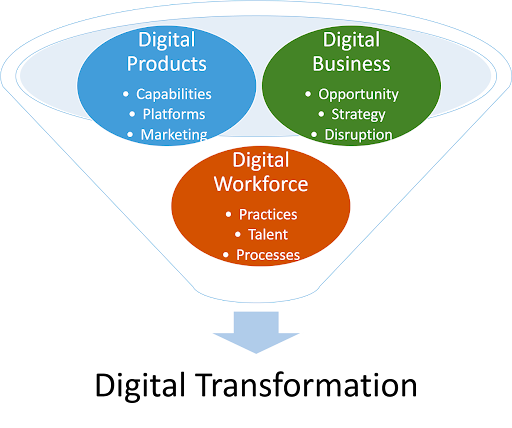
Digital transformation is the integration of digital technologies across all areas of an organization, fundamentally changing how it operates and delivers value to customers. It is not just about adopting new tools or systems; it involves rethinking business models, processes, and customer experiences to stay relevant in a digitally driven world.
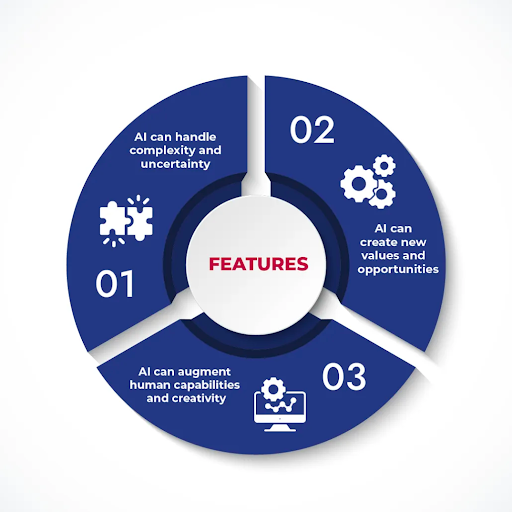
This transformation requires more than just technology it demands a cultural shift within organizations. AI in business transformation is a cornerstone of this shift, offering tools and capabilities that amplify human potential, automate routine tasks, and enable data-driven decision-making.
How AI Powers Digital Transformation?
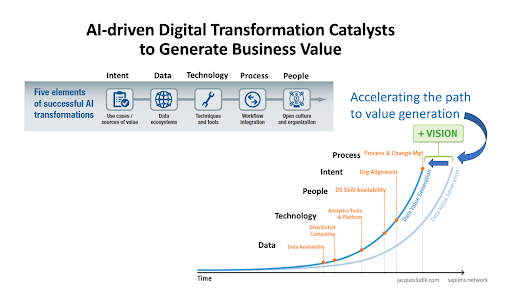
AI-driven digital transformation plays a multifaceted role in digital transformation. By leveraging its capabilities, businesses can develop new efficiencies, enhance customer engagement, and foster innovation.
Here’s a detailed look at the transformation of AI in digital strategy.
Revolutionizing Decision-Making Through Data Insights
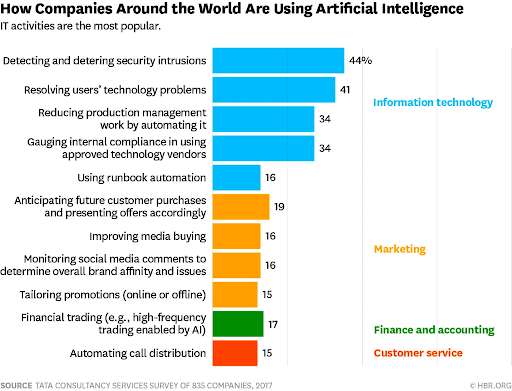
AI’s ability to process and analyze large datasets in real-time makes it a good tool for decision-making. Traditional methods of data analysis are time-consuming and often prone to human error.
AI-based digital transformation solutions can deal with complex datasets to identify patterns, trends, and insights.
- Predictive Analytics: AI models help forecast future scenarios, enabling businesses to anticipate market trends, manage risks, and allocate resources effectively.
- Retail: Walmart uses AI-driven predictive analytics to forecast the demand for products based on factors like seasonality, customer behavior, and regional trends. This helps optimize inventory and reduce overstock or stockouts.
- Healthcare: IBM Watson Health analyzes patient data to predict diseases like cancer early, allowing timely intervention and treatment plans.
- Real-Time Insights: AI tools like dashboards and reporting software provide actionable insights, allowing organizations to respond promptly to changing conditions.
- Finance: JPMorgan Chase uses AI tools to analyze market trends in real time, allowing traders to make informed investment decisions.
- Logistics: FedEx employs AI to monitor real-time package movements and optimize delivery routes, ensuring faster and more reliable shipments.
Creating Personalized Customer Experiences
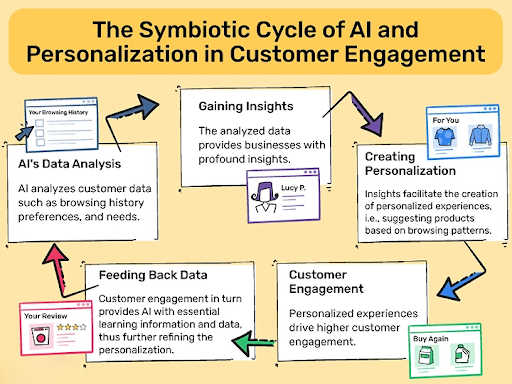
AI transforms customer interactions by enabling hyperpersonalization. AI systems analyze user behavior, preferences, and feedback through machine learning and natural language processing to offer highly customized experiences.
- Recommendation Engines: AI-powered platforms like Netflix, Spotify, and Amazon use customer data to recommend products, movies, or music tailored to individual tastes.
- Streaming: Netflix leverages AI algorithms to recommend shows and movies based on viewing history, boosting user engagement and satisfaction.
- E-Commerce: Amazon uses AI to suggest products based on a customer’s browsing and purchase history, increasing cross-sell and upsell opportunities.
- Dynamic Customer Journeys: AI can modify a customer’s journey in real-time, offering unique pathways based on interactions and preferences.
- Travel: Airlines like Emirates use AI to analyze customer preferences, offering tailored travel packages or upgrades based on loyalty data.
- Retail: Sephora’s AI-powered virtual assistant provides personalized makeup recommendations by analyzing customer preferences and feedback.
This personalization not only enhances customer satisfaction but also drives sales and brand loyalty.
Streamlining Operations with Automation

AI’s automation capabilities are revolutionizing business operations by reducing manual intervention in repetitive tasks, lowering operational costs, and increasing accuracy.
- Robotic Process Automation (RPA): AI for enterprise transformation automates routine processes like invoice processing, data entry, and customer support.
- Banking: HSBC uses RPA to automate credit card application processes, reducing processing time and ensuring error-free applications.
- Telecom: AT&T employs RPA to handle repetitive tasks like billing, leading to improved efficiency and customer satisfaction.
- AI Chatbots and Virtual Assistants: Tools like ChatGPT and Alexa handle queries, book appointments, and provide 24/7 customer assistance.
- Customer Support: E-commerce platforms like Flipkart and Alibaba deploy AI chatbots to handle customer queries, resolve issues, and track orders efficiently.
- Healthcare: Babylon Health uses AI-powered chatbots to provide preliminary health assessments and schedule doctor appointments.
Driving Innovation Across Industries
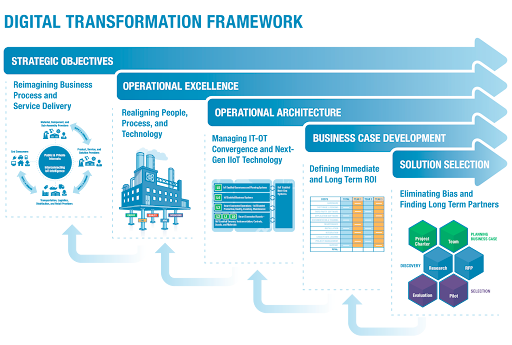
AI fosters innovation by unlocking new possibilities in product development, service delivery, and business models. It serves as the foundation for contemporary technologies like autonomous vehicles, advanced robotics, and intelligent systems.
- Healthcare Innovation: AI accelerates drug discovery and enables precision medicine tailored to individual genetic profiles.
- Drug Discovery: Pfizer uses AI to speed up the discovery of new drugs by analyzing molecular data and predicting potential drug candidates.
- Medical Imaging: Google Health employs AI to detect conditions like diabetic retinopathy and breast cancer from medical images with high accuracy.
- Manufacturing Advancements: AI-powered robotics and IoT sensors enhance productivity and reduce downtime in manufacturing processes.
- Robotics: Tesla’s Gigafactories use AI-powered robotics to streamline the production of electric vehicles, enhancing efficiency and scalability.
- Quality Control: Siemens integrates AI in manufacturing to detect defects during production, ensuring consistent quality standards.
AI’s capacity to learn and adapt allows businesses to stay ahead of competitors by continuously innovating and exploring new opportunities.
Enhancing Operational Efficiency
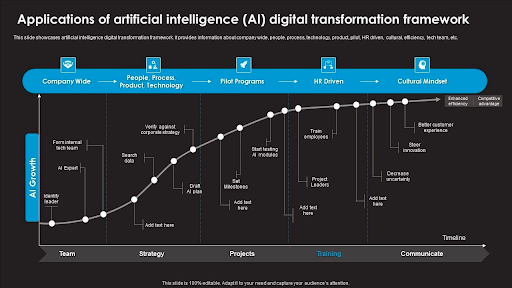
Efficiency is at the core of digital transformation, and AI significantly enhances it by optimizing workflows and minimizing waste.
- Predictive Maintenance: In industries like manufacturing and aviation, AI sensors monitor equipment performance to predict failures and schedule maintenance, reducing downtime.
- Aviation: Boeing uses AI to predict maintenance needs for aircraft engines, minimizing downtime and enhancing safety.
- Manufacturing: GE utilizes AI in its factories to monitor equipment performance and preemptively address potential failures, reducing costs and delays.
- Energy Optimization: AI solutions in smart grids and buildings analyze energy usage patterns, enabling cost savings and sustainable practices.
- Utilities: Schneider Electric deploys AI in smart grids to analyze energy consumption patterns and recommend energy-saving measures.
- Buildings: Google’s DeepMind AI reduced energy consumption in Google’s data centers by optimizing cooling systems, achieving a 40% reduction in energy usage.
These optimizations not only boost profitability but also align with sustainability goals, making AI transformation services critical for the future.
Challenges of AI in Digital Transformation
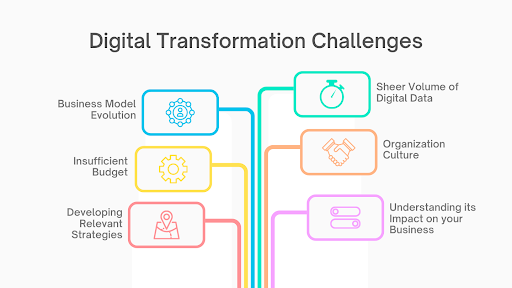
Despite its potential, the adoption of AI digital transformation technologies has many challenges. Organizations must navigate several hurdles to implement AI effectively and for enhancing business with AI.
Data Privacy and Security
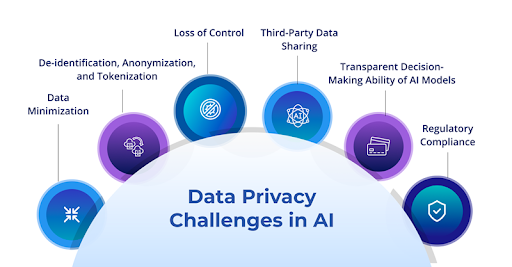
AI business model systems rely heavily on massive datasets to function effectively. These datasets often include sensitive customer information, such as personal details, purchasing habits, and financial records.
While this data is essential for training AI models, it also raises significant concerns around privacy and security.
- Regulatory Compliance: Governments and regulatory bodies worldwide have introduced stringent data protection laws such as the General Data Protection Regulation (GDPR) in Europe and the California Consumer Privacy Act (CCPA) in the United States.
- Risks of Data Breaches: AI systems are vulnerable to cyberattacks, including data breaches and hacking.
- Mitigation Strategies: Companies must invest in robust cybersecurity measures, such as encryption, firewalls, and AI-powered security tools.
Skill Gaps
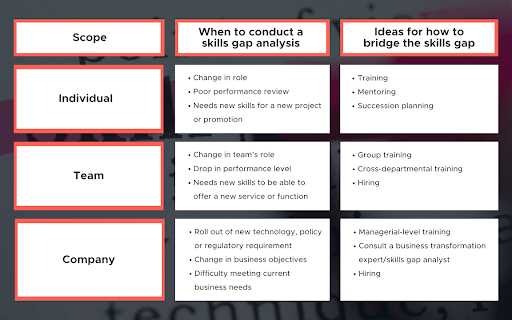
The growing demand for AI solutions has outpaced the availability of skilled professionals, creating a significant talent gap in the industry.
- Shortage of Expertise: Implementing AI in business requires expertise in data science, machine learning, and software engineering.
- Training Costs: Upskilling existing employees to work with digital revolution AI technologies requires substantial investment in training programs.
- Retention Issues: Skilled AI professionals are highly sought after, leading to fierce competition among employers. Retaining such talent can be difficult, especially for organizations that cannot match the compensation or benefits offered by tech giants.
- Solutions: Businesses can partner with academic institutions and online platforms to train their workforce.
Bias and Fairness
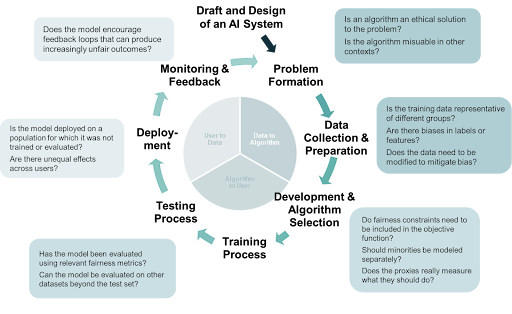
AI technology in business systems is only as good as the data they are trained on. If the training data contains biases, the AI digital innovation may reinforce or even amplify these biases, which could result in unfair or unethical outcomes.
- Sources of Bias: Bias can arise from incomplete, unrepresentative, or historically skewed datasets. For example, facial recognition systems have been criticized for poor accuracy when identifying individuals from minority groups, primarily due to biased training data.
- Ethical Concerns: Biased AI can lead to discriminatory practices, such as denying loans based on gender or ethnicity or making biased hiring decisions.
- Addressing Bias: Ensuring fairness requires diverse datasets that accurately represent the population. Regular audits of AI models and the inclusion of ethics-focused teams in the AI development process are essential.
Integration Complexity
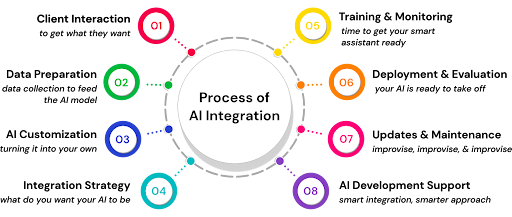
- Organizational Resistance: Employees may resist the introduction of AI, fearing job displacement or additional workload. This resistance can hinder the seamless integration of AI solutions.
- Strategies for Integration: To ease the process, organizations can adopt a phased approach, starting with pilot projects to demonstrate AI’s value.
The challenges of digital transformation with AI are real but not insurmountable. Organizations must adopt a proactive approach to address issues related to data privacy, skill shortages, bias, and integration.
By investing in robust policies, training, and ethical practices, businesses can navigate these hurdles effectively and harness the transformative power of AI’s impact on industries.
Future of AI in Digital Transformation
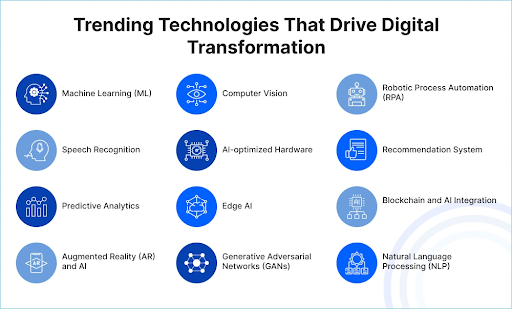
The future of AI is poised to be even more transformative, with emerging trends and technologies expanding its applications.
- Generative AI: Tools like ChatGPT and DALL-E are pushing the boundaries of creativity, enabling businesses to generate content, designs, and solutions in innovative ways.
- Edge AI: AI capabilities are moving closer to the source of data collection, enabling real-time decision-making in devices like smartphones and IoT systems.
- Quantum AI: Combining quantum computing with AI could exponentially increase computational power, solving problems that are currently intractable.
AI is also being integrated into various industries, such as healthcare, finance, and manufacturing, to improve efficiency and accuracy.
As business efficiency AI continues to advance, it will be crucial for businesses to adapt and leverage these technologies to stay ahead in the rapidly evolving market.
Conclusion
The role of artificial intelligence is not merely a component of digital transformation; it is the driving force behind it. From automating routine tasks to fostering machine learning transformation, AI empowers organizations to navigate the complexities of the digital age.
However, successful implementation requires strategic planning, a focus on ethical practices, and a commitment to continuous learning. As industries embrace AI, its role in shaping the future of business and society will only grow, making it an important tool for any organization looking to thrive in the modern world.
Deepak Wadhwani has over 20 years experience in software/wireless technologies. He has worked with Fortune 500 companies including Intuit, ESRI, Qualcomm, Sprint, Verizon, Vodafone, Nortel, Microsoft and Oracle in over 60 countries. Deepak has worked on Internet marketing projects in San Diego, Los Angeles, Orange Country, Denver, Nashville, Kansas City, New York, San Francisco and Huntsville. Deepak has been a founder of technology Startups for one of the first Cityguides, yellow pages online and web based enterprise solutions. He is an internet marketing and technology expert & co-founder for a San Diego Internet marketing company.

